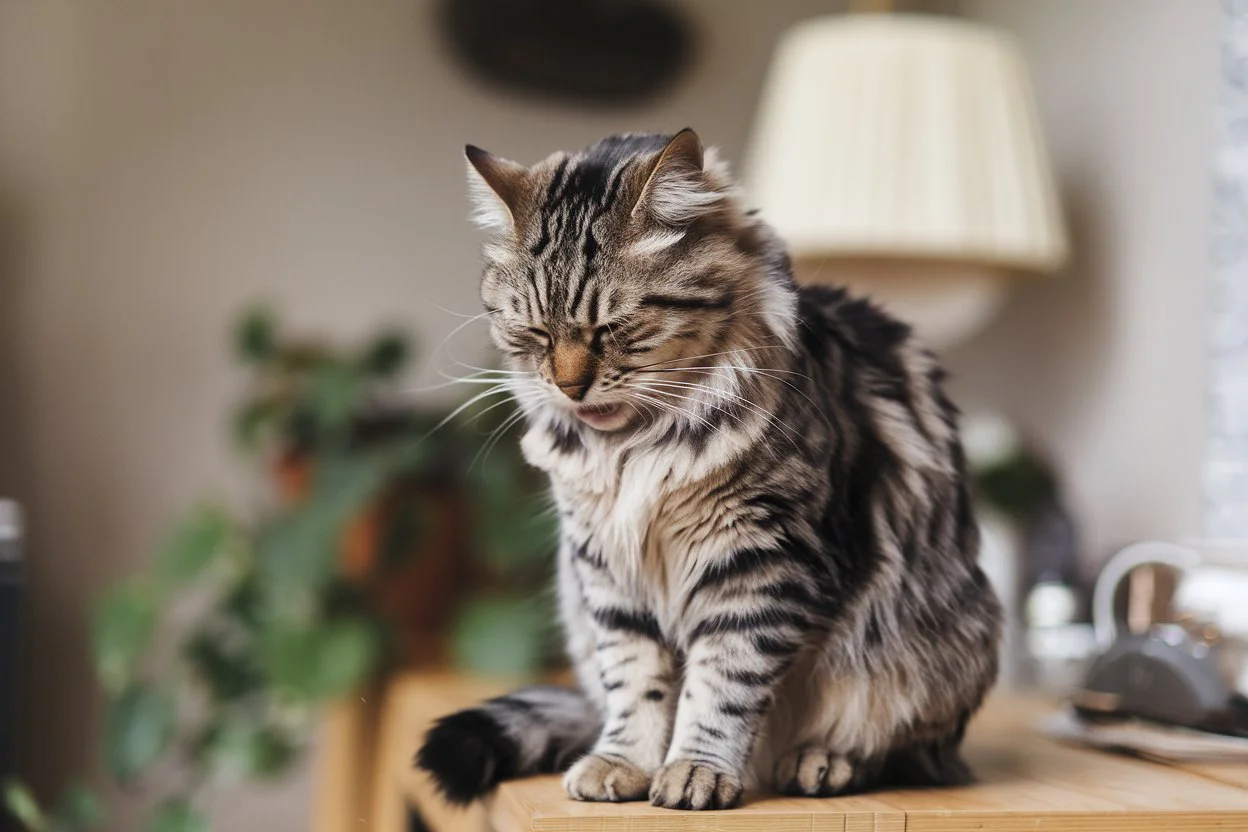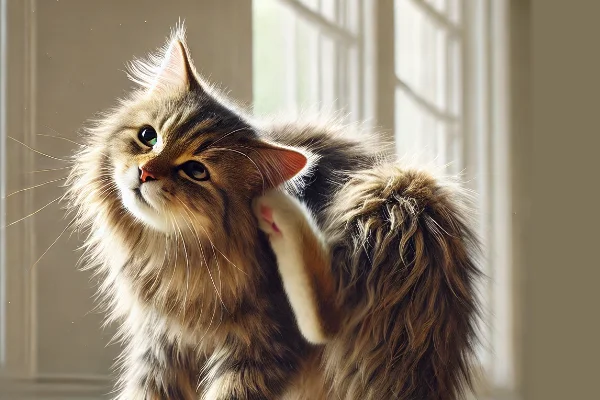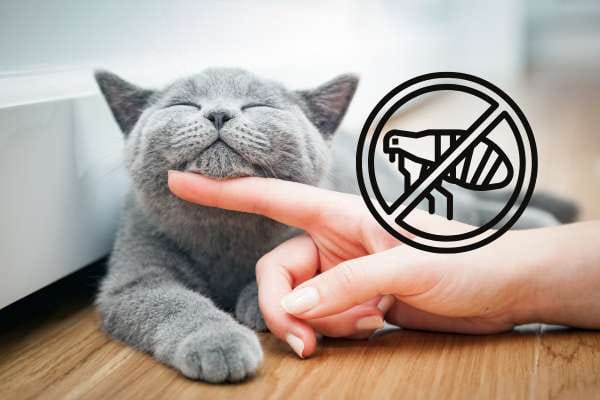As a seasoned cat owner, it can be distressing to witness your feline companion scratching incessantly, exhibiting unusual grooming habits, or displaying other abnormal behaviors. These symptoms could be indicative of allergies in cats, which are more prevalent than many pet owners realize. Allergies in cats can arise from various sources, including environmental factors, food sensitivities, and even genetic predispositions. If left untreated, these allergies can lead to discomfort, skin problems, and potentially serious health complications for your beloved pet.
Fortunately, some natural remedies and methods can help alleviate the suffering caused by allergies in cats. In this comprehensive guide, we delve into the common signs of allergies in cats. We also explore effective ways to treat them naturally, empowering you to provide your cat with the relief they need. Keep reading to discover the telltale signs of allergies in cats and learn how to harness the power of natural treatments to restore your pet’s health and happiness.
- Whisker Woes: Identifying the Telltale Signs of Allergies in Cats
- The Itch Factor: Understanding the Causes of Allergies in Cats
- Purr-fectly Natural: Holistic Approaches to Treating Allergies in Cats
- Feline Food for Thought: The Role of Nutrition in Managing Allergies
- Exploring Alternative Treatments for Allergies in Cats
- Creating an Allergy-Friendly Home: Tips for Reducing Your Cat's Exposure
- Conclusion: Taking Control of Your Cat's Allergies Naturally

Whisker Woes: Identifying the Telltale Signs of Allergies in Cats
Identifying the telltale signs of allergies in cats can be a crucial step in providing timely relief and preventing further complications. Allergic reactions in felines can manifest in various ways, ranging from skin irritations to respiratory issues. One of the most common indicators is excessive grooming or licking. Additionally, cats may experience recurrent ear infections, accompanied by head shaking, scratching, and redness or swelling around the ear area.
Another significant sign to watch out for is gastrointestinal distress, such as vomiting, diarrhea, or a sudden change in appetite. Respiratory symptoms like sneezing, wheezing, or nasal discharge can also indicate an allergic reaction. It’s important to note that some cats may exhibit a combination of these signs. Monitoring your feline companion’s behavior and physical appearance can help you identify potential allergies early on.
The Itch Factor: Understanding the Causes of Allergies in Cats

What are the most common allergens that affect cats?
Cats can develop allergies to a wide range of substances, both environmental and dietary. Some of the most common allergens that affect felines are
Environmental Allergens:
- Pollen: Just like humans, cats can be allergic to various types of pollen from trees, grasses, and weeds. Seasonal allergies are common when pollen levels are high.
- Dust and Dust Mites: Household dust and the microscopic dust mites that thrive in it can trigger allergic reactions in cats.
- Mold: Mold spores present in damp areas or poorly ventilated spaces can cause allergic responses in sensitive cats.
- Flea Saliva: Flea bites and the saliva they inject can lead to intense itching and skin irritation in cats with flea allergies.
Dietary Allergens:
- Proteins: Proteins from common ingredients like beef, dairy, chicken, and fish are among the most frequent culprits of food allergies in cats.
- Grains: Allergies to grains like wheat, corn, and soy are also relatively common in felines.
- Additives and Preservatives: Some cats may react adversely to certain food additives, preservatives, or artificial flavors used in commercial cat foods.
It’s important to note that cats can develop allergies to multiple substances simultaneously, making it challenging to pinpoint the exact trigger. Identifying and avoiding exposure to the offending allergens is crucial for managing allergic reactions and ensuring your feline companion’s well-being.
Purr-fectly Natural: Holistic Approaches to Treating Allergies in Cats
Holistic approaches to treating allergies in cats have gained significant popularity in recent years as pet owners seek more natural and gentle alternatives to traditional medications. These methods aim to address the underlying causes of allergies rather than merely suppressing the symptoms. One of the most effective holistic remedies is dietary management. By identifying and eliminating potential allergens from your cat’s diet, you can help reduce inflammation and alleviate allergy symptoms.
Another promising holistic approach is the use of supplements and herbs. Omega-3 fatty acids, found in fish oil or flaxseed oil, can help reduce inflammation and support a healthy immune system. Relief your cat from itching and skin irritation with herbs like quercetin and bromelain. Their natural antihistamine and anti-inflammatory will help your cat. However, it’s crucial to consult with a holistic veterinarian before introducing any supplements or herbs to your cat’s regimen
Feline Food for Thought: The Role of Nutrition in Managing Allergies
A balanced diet plays a crucial role in preventing or reducing allergy symptoms in cats. By providing the right nutrients and avoiding potential allergens, you can support your feline friend’s overall health and minimize the impact of allergies.
One of the most important aspects of a balanced diet for cats with allergies is the inclusion of high-quality protein sources. Opt for lean meats, such as chicken, turkey, or fish, as they are less likely to trigger allergic reactions compared to beef or dairy products. Additionally, incorporating omega-3 fatty acids from sources like fish oil or flaxseed can help reduce inflammation and alleviate skin irritation. On the other hand, avoid ingredients like corn, wheat, soy, and artificial preservatives, as they are common allergens for cats. Instead, choose a grain-free or limited-ingredient diet to minimize the risk of adverse reactions.
Exploring Alternative Treatments for Allergies in Cats
Alternative therapies can complement conventional treatments in managing allergies in cats. Here are some options
- Acupuncture: This ancient Chinese practice involves inserting thin needles into specific points to stimulate healing and balance. Acupuncture can help reduce inflammation, itching, and stress associated with allergies
- Herbal Medicine: Certain herbs, such as omega-3 fatty acids, aloe vera, and nettle leaf, have anti-inflammatory and antihistamine properties that may alleviate allergy symptoms.
- Homeopathy: Homeopathic remedies, like Apis mellifica and Urtica urens, can help soothe skin irritations and itching.
- Dietary Changes: Feeding a balanced, hypoallergenic diet rich in omega-3 fatty acids and antioxidants can support skin health and reduce inflammation.
- Probiotics: Beneficial bacteria in probiotics can maintain gut health, which is linked to immune system function and allergy management.
- Massage Therapy: Gentle massage can help reduce stress and promote relaxation, which can alleviate allergy-related discomfort.
Creating an Allergy-Friendly Home: Tips for Reducing Your Cat’s Exposure
You can follow these practical strategies to minimize allergens and enhance comfort for you and your feline friend
- Remove allergen sources: Eliminate carpets, rugs, and upholstered furniture that trap allergens like dust mites, pet dander, and pollen.
- Clean regularly: Vacuum with HEPA filters, dust with damp cloths, and mop hard floors to reduce allergen accumulation.
- Control humidity: Use a dehumidifier to prevent mold growth and keep humidity levels below 50%.
- Use allergen-proof bedding: Cover mattresses, box springs, and pillows with allergen-proof encasings.
- Filter the air: Install HEPA air purifiers to remove airborne allergens.
Conclusion: Taking Control of Your Cat’s Allergies Naturally
In conclusion, recognizing the signs of allergies in your cat is essential for ensuring their happiness and health. By understanding the causes and symptoms, you can take proactive steps to relieve their discomfort. Embracing natural remedies not only supports your cat’s well-being but fosters a holistic approach to care.
Your pet relies on you to advocate for their health—don’t let them suffer in silence. Consult your veterinarian about natural treatment options that can bring relief. Share your experiences with fellow cat owners as we work together to prioritize the health and happiness of our beloved pets.





